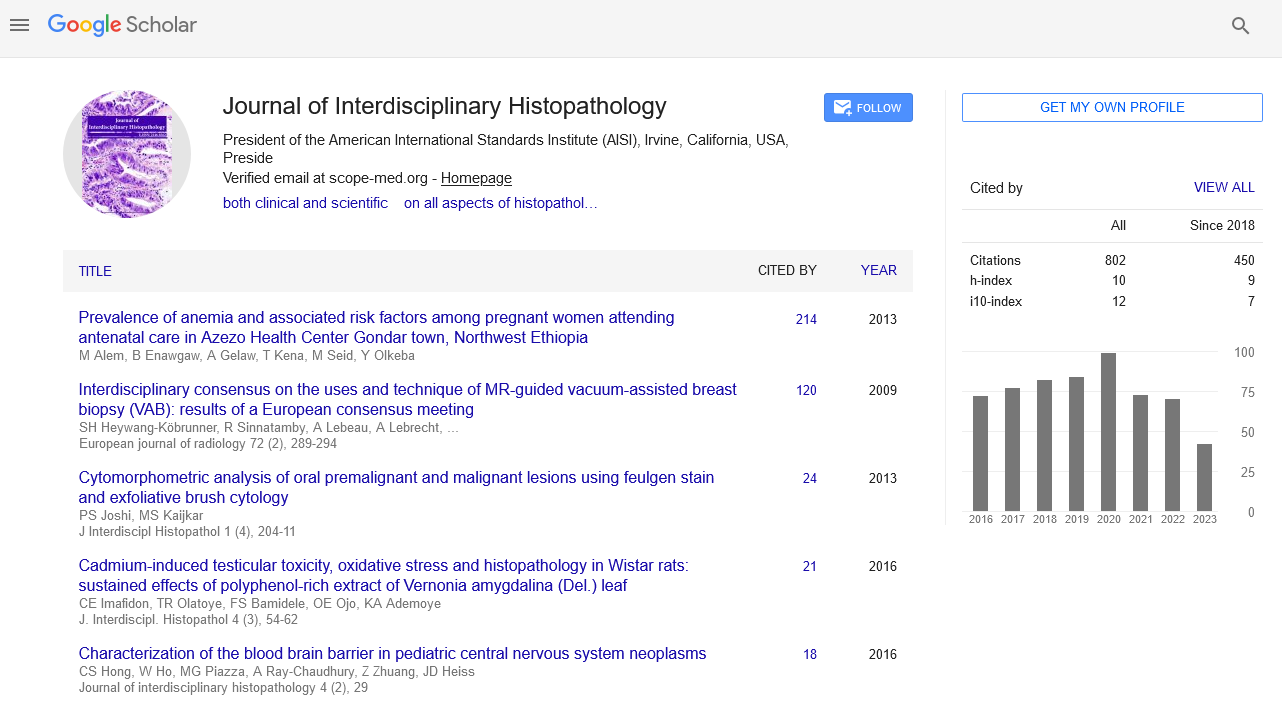Short Communication - Journal of Interdisciplinary Histopathology (2024)
Deciphering Disease Complexity: Systems Pathology’s Path to Personalized Healthcare
Márquez Haruki*Márquez Haruki, Department of Pathology, Maastricht University, Maastricht, The Netherlands, Email: mqhk_89.ui@gmail.com
Received: 15-Apr-2024, Manuscript No. EJMJIH-24-135381; Editor assigned: 18-Apr-2024, Pre QC No. EJMJIH-24-135381(PQ); Reviewed: 03-May-2024, QC No. EJMJIH-24-135381; Revised: 10-May-2024, Manuscript No. EJMJIH-24-135381(R); Published: 17-May-2024
About the Study
In the ever-evolving landscape of healthcare, traditional approaches to understanding and treating diseases are being complemented and sometimes supplanted by more comprehensive methodologies. At the forefront of this evolution is systems pathology-a discipline that seeks to illuminate the complex web of interactions underlying disease states. By adopting a systems-level perspective, systems pathology endeavors to decipher the complexity of diseases, offering new insights into diagnosis, prognosis, and therapeutic intervention.
Understanding disease as a network: The core tenet of systems pathology
Systems pathology departs from reductionist approaches by viewing diseases not as isolated phenomena but as manifestations of perturbations within interconnected biological networks. This fundamental shift in perspective recognizes that diseases arise from the dysregulation of multiple molecular, cellular, and physiological processes [1]. By embracing the concept of disease as a network phenomenon, systems pathology aims to resolve the hidden connections and emergent properties that govern pathological states.
Harnessing advanced technologies: Tools for deciphering complexity
Central to the mission of systems pathology is the utilization of modern technologies to capture the intricacies of biological systems [2]. Highthroughput omics techniques, including genomics, transcriptomics, proteomics, and metabolomics, serve as powerful tools for generating vast datasets that encapsulate the molecular signatures of disease [3]. These technologies enable researchers to identify lead and pathways involved in disease pathogenesis, laying the foundation for deeper insights into disease mechanisms.
Integration and interpretation: Making sense of complex data
While data generation is essential, the true power of systems pathology lies in the integration and interpretation of complex datasets. Bioinformatics and computational modeling play pivotal roles in synthesizing multi-omics data, constructing predictive models, and elucidating emergent properties of biological systems [4]. Through sophisticated analytical approaches, researchers can uncover hidden relationships, identify biomarkers of disease, and delineate novel therapeutic targets, thereby translating raw data into actionable insights [5].
Bridging the gap between research and clinical practice
One of the overarching goals of systems pathology is to translate research findings into tangible benefits for patients [6]. By integrating molecular data with clinical parameters, imaging studies, and patient outcomes, systems pathology aims to enhance diagnostic accuracy and facilitate the development of personalized treatment strategies [7]. This translational approach holds promise for improving patient outcomes, reducing healthcare costs, and advancing the practice of precision medicine [8].
Challenges and ethical considerations: Navigating the road ahead
Despite its potential, systems pathology faces a myriad of challenges on the path to widespread adoption. The integration of diverse data types, the interpretation of complex datasets, and the translation of research findings into clinical practice represent formidable hurdles that must be overcome [9]. Moreover, ethical considerations surrounding data privacy, informed consent, and equitable access to emerging technologies necessitate careful deliberation and proactive safeguards [10].
Towards a future of personalized healthcare
In systems pathology represents a paradigm shift in our approach to understanding and combating disease. By illuminating the complex interactions that underlie pathological states, it empowers researchers and clinicians with the knowledge and tools needed to navigate the complex landscape of human health. As we continue to resolve the mysteries of disease through the lens of systems pathology, we move ever closer to a future where healthcare is not only personalized but truly transformative in its impact on individual lives and society as a whole.
References
- Khoshiwal AM, Frei NF, Pouw RE; TissueCypher SURF LGD Study Pathologists Consortium; Smolko C, Arora M, et al. The Tissue Systems Pathology Test Outperforms Pathology Review in Risk Stratifying Patients With Low-Grade Dysplasia. Gastroenterology 2023 ;165(5):1168-1179.e6.
[Crossref] [Google Scholar] [PubMed]
- Davison JM, Goldblum JR, Duits LC, Khoshiwal AM, Bergman JJ, Falk GW, et al. A Tissue Systems Pathology Test Outperforms the Standard-of-Care Variables in Predicting Progression in Patients With Barrett's Esophagus. Clin Transl Gastroenterol 2023 ;14(11):e00631.
[Crossref] [Google Scholar] [PubMed]
- Rollo J, Crawford J, Hardy J. A dynamical systems approach for multiscale synthesis of Alzheimer's pathogenesis. Neuron 2023 ;111(14):2126-2139.
[Crossref] [Google Scholar] [PubMed]
- Tretter F, Peters EMJ, Sturmberg J, Bennett J, Voit E, Dietrich JW, et al. Perspectives of (/memorandum for) systems thinking on COVID-19 pandemic and pathology. J Eval Clin Pract 2023 ;(3):415-429.
[Crossref] [Google Scholar] [PubMed]
- Li J, Che M, Zhang B, Zhao K, Wan C, Yang K. The association between the neuroendocrine system and the tumor immune microenvironment: Emerging directions for cancer immunotherapy. Biochim Biophys Acta Rev Cancer 2023 ;1878(6):189007.
[Crossref] [Google Scholar] [PubMed]
- Altamura C, Coppola G, Vernieri F. The evolving concept of multimorbidity and migraine. Handb Clin Neurol 2024;199:535-566.
[Crossref] [Google Scholar] [PubMed]
- Carnevale K, Saxena R, Talmon GA, Lin A, Padilla O, Kreisle RA. Pathology teaching in different undergraduate medical curricula within and outside the United States: a pilot study. Acad Pathol 2023 Dec ;11(1):100102.
[Crossref] [Google Scholar] [PubMed]
- Peabody JW, Cruz JDC, Ganesan D, Paculdo D, Critchley-Thorne RJ, Wani S, et al. A Randomized Controlled Study on Clinical Adherence to Evidence-Based Guidelines in the Management of Simulated Patients With Barrett's Esophagus and the Clinical Utility of a Tissue Systems Pathology Test: Results From Q-TAB. Clin Transl Gastroenterol 2024;15(1):e00644.
[Crossref] [Google Scholar] [PubMed]
- Braunstein EM, Imada E, Pasca S, Wang S, Chen H, Alba C, et al. Recurrent germline variant in ATM associated with familial myeloproliferative neoplasms. Leukemia 2023 ;37(3):627-635.
[Crossref] [Google Scholar] [PubMed]
- Armeni E, Alexandraki KI, Roncaroli F, Grossman AB. Primary pituitary carcinoids do not exist: a reappraisal in the era of pituitary neuroendocrine tumours. Arch Med Res. 2023 ;54(8):102841.
[Crossref] [Google Scholar] [PubMed]






